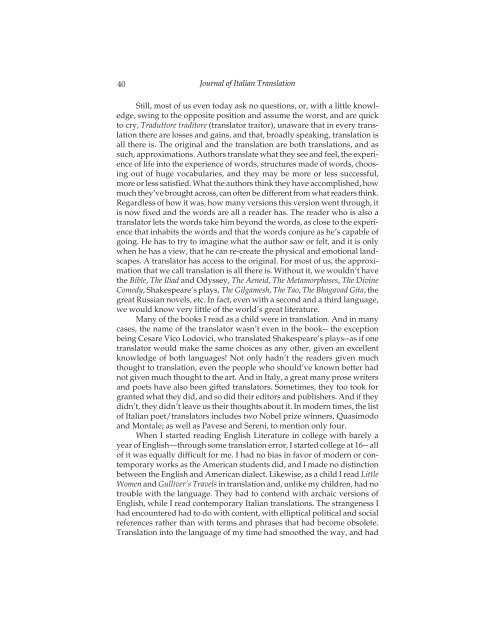Journal of Italian Translation
Journal of Italian Translation
Journal of Italian Translation
You also want an ePaper? Increase the reach of your titles
YUMPU automatically turns print PDFs into web optimized ePapers that Google loves.
40<br />
<strong>Journal</strong> <strong>of</strong> <strong>Italian</strong> <strong>Translation</strong><br />
Still, most <strong>of</strong> us even today ask no questions, or, with a little knowledge,<br />
swing to the opposite position and assume the worst, and are quick<br />
to cry, Traduttore traditore (translator traitor), unaware that in every translation<br />
there are losses and gains, and that, broadly speaking, translation is<br />
all there is. The original and the translation are both translations, and as<br />
such, approximations. Authors translate what they see and feel, the experience<br />
<strong>of</strong> life into the experience <strong>of</strong> words, structures made <strong>of</strong> words, choosing<br />
out <strong>of</strong> huge vocabularies, and they may be more or less successful,<br />
more or less satisfied. What the authors think they have accomplished, how<br />
much they’ve brought across, can <strong>of</strong>ten be different from what readers think.<br />
Regardless <strong>of</strong> how it was, how many versions this version went through, it<br />
is now fixed and the words are all a reader has. The reader who is also a<br />
translator lets the words take him beyond the words, as close to the experience<br />
that inhabits the words and that the words conjure as he’s capable <strong>of</strong><br />
going. He has to try to imagine what the author saw or felt, and it is only<br />
when he has a view, that he can re-create the physical and emotional landscapes.<br />
A translator has access to the original. For most <strong>of</strong> us, the approximation<br />
that we call translation is all there is. Without it, we wouldn’t have<br />
the Bible, The Iliad and Odyssey, The Aeneid, The Metamorphoses, The Divine<br />
Comedy, Shakespeare’s plays, The Gilgamesh, The Tao, The Bhagavad Gita, the<br />
great Russian novels, etc. In fact, even with a second and a third language,<br />
we would know very little <strong>of</strong> the world’s great literature.<br />
Many <strong>of</strong> the books I read as a child were in translation. And in many<br />
cases, the name <strong>of</strong> the translator wasn’t even in the book-- the exception<br />
being Cesare Vico Lodovici, who translated Shakespeare’s plays--as if one<br />
translator would make the same choices as any other, given an excellent<br />
knowledge <strong>of</strong> both languages! Not only hadn’t the readers given much<br />
thought to translation, even the people who should’ve known better had<br />
not given much thought to the art. And in Italy, a great many prose writers<br />
and poets have also been gifted translators. Sometimes, they too took for<br />
granted what they did, and so did their editors and publishers. And if they<br />
didn’t, they didn’t leave us their thoughts about it. In modern times, the list<br />
<strong>of</strong> <strong>Italian</strong> poet/translators includes two Nobel prize winners, Quasimodo<br />
and Montale; as well as Pavese and Sereni, to mention only four.<br />
When I started reading English Literature in college with barely a<br />
year <strong>of</strong> English—through some translation error, I started college at 16-- all<br />
<strong>of</strong> it was equally difficult for me. I had no bias in favor <strong>of</strong> modern or contemporary<br />
works as the American students did, and I made no distinction<br />
between the English and American dialect. Likewise, as a child I read Little<br />
Women and Gulliver’s Travels in translation and, unlike my children, had no<br />
trouble with the language. They had to contend with archaic versions <strong>of</strong><br />
English, while I read contemporary <strong>Italian</strong> translations. The strangeness I<br />
had encountered had to do with content, with elliptical political and social<br />
references rather than with terms and phrases that had become obsolete.<br />
<strong>Translation</strong> into the language <strong>of</strong> my time had smoothed the way, and had
















